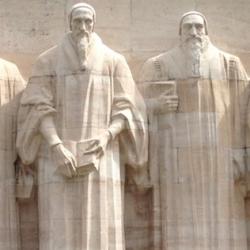A number of people have raised objections of different sorts to my posts on Protestants and writing. In the nature of the case, I’m not going to resolve these issues with a blog post or two, and it would be passing tedious to answer every criticism of every critic. The objections are mainly of the sort I’ve already addressed a bit here, but let me respond all too briefly to two thoughtful counters.
Derek Rishmawy recognizes that my target is narrower than my title. My brief is brought against (primarily) North American Evangelicals of the past century. He concedes my complaint about the weakness of Evangelical poetry and fiction, but is doubtful that sacramental theology is the culprit. He rounds up a set of alternative suspects – a diminished, other-worldly eschatology; conversionism; the Fundamentalist disengagement from culture; prudery; literalism in biblical interpretation; anti-intellectualism.
These are all factors in forming the ethos of Evangelical churches, and to my mind they form a constellation of habits, sensibilities, modes of thought and feeling that may be called “Evangelical gnosticism.” Sacramental theology and practice crystallize these tendencies, and bring them into the heart of the church, into Christian worship. (My article was imbalanced in highlighting sacramental theology. An exclusive focus on theology threatens to collapse into a version of the intellectualism I’m attacking. Sacramental practice and the imaginary that it expresses and fosters are the issues.)
Steven Wedgeworth thinks that my broad-brush story-telling is “fiction” – as in, untrue. He faults me for letting assumptions and assertions do a lot of my work for me, which is true enough: What I proposed is a thesis, a hunch and an intuition. My essay was an intervention, a provocation, intended to rouse, written on the premise that non-fiction genres other than academic treatises have their uses. Steven wants “concrete data”; so do I, but every quest for concrete data begins with a glimpse of a master story, a dream of destination, albeit one that must remain supple enough to dance with the data, promiscuous enough to change partners if that proves necessary.
Steven says my essay is a piece of nostalgia, a “Road Not Taken” story, in line with Brad Gregory, MacIntyre and Weaver. I do regard many aspects of the contemporary world negatively; as, truth be told, does Steven, who admits “there is a real crisis in the modern world of arts, letters, and religion,” an opinion evident in his list of Protestant writers, which ends in the nineteenth century. But to regard my essay as nostalgic misses my point – also MacIntyre’s, I think. There is perhaps a moment of nostalgia, but the aim is relativization. It’s the maneuver of the nouvelle theologie, which recovered a patristic and early medieval past to mount critiques of counter-Reformation neo-Thomism and juridical conceptions of the church; it’s the move of medievalist postmoderns, who reach back to pre-modernity not to dwell in the past but to relativize the seemingly impregnable modern present. “Once there was no secular,” says John Milbank, in order to demonstrate that “secularity” is a contingent historical formation, and therefore not woven into the fabric of things, and therefore challengeable. All these use the past to relativize the present in the interests of fresh directions for the future. I don’t know, though, whether Steven will find relativization more congenial than nostalgia.
Steven is right that “Zwingli” is more symbol than Reformer in my essay. I don’t think that he’s a “mere symbol” (as Steven cleverly suggests) but I’ll leave the historical Zwingli to the side. There is an anti-liturgical, anti-ritual bias in Protestantism that arguably has roots in the sixteenth and seventeenth centuries, and that is the outlook that, I argue (intuit, hypothesize), has had a deadening effect on the Christian imagination. I agree with Steven that modernity has made its stunning contributions, one of which is to explore the role that ritual, and anti-ritual, play in the formation of the imagination.
One last response: Steven devotes several paragraphs to the issue of literary “greatness,” not at all the topic of my essay. I’d be giddy to see a steady supply of competent poets, novelists, and artists coming out of the American Evangelical churches. They don’t need to be great or famous; they need only be craftsmen and craftswomen, striving for excellence, their work honored by the church.
Jesus the New Creator is present to us by His Spirit in Word and Sacrament. That is admittedly an article of faith rather than the result of scholarly research, and it’s what led to the conclusion of my original essay: “The renewal of literature, like the renewal of the world, begins in worship. The renewal of literature, like the renewal of the world, begins from the pulpit, to be sure. But the pulpit will renew literature only when it is nestled where it should be nestled, between the font and the table.”















